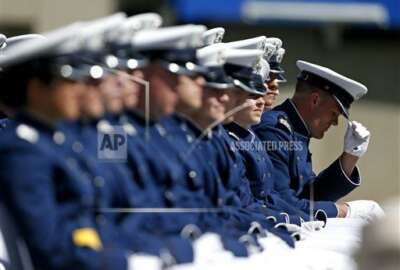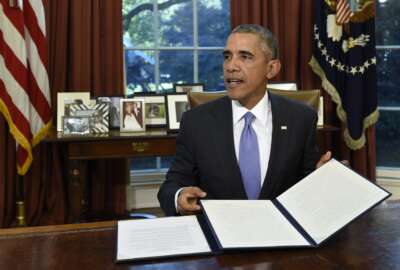
Obama vetoes Defense authorization bill, puts pay raise in limbo
The President rejected the fiscal 2016 Defense Authorization bill. The $612 billion legislation included a 1.3 person pay raise, a new retirement system, and...
President Barack Obama on Thursday vetoed the 2016 National Defense Authorization Act, jeopardizing troop salaries and putting in limbo plans for overhauls of the acquisition process and health insurance for service members.
The President rejected the $612 billion defense policy bill, saying that while it “does a number of good things,” it “falls woefully short” in certain areas and “resorts to gimmicks” when it comes to funding the military.
“I’m going to be sending it back to Congress,” Obama said during the Oct. 22 veto signing in the Oval Office. “And my message to them is very simple: let’s do this right. We’re in the midst of budget discussions — let’s have a budget that properly funds our national security as well as economic security. Let’s make sure that we’re able, in a constructive way, to reform our military spending to make it sustainable over the long term, and let’s make sure that, in a responsible way, we can draw down the populations in Guantanamo, make sure that the American people are safe, and make sure that we’re not providing the kinds of recruitment tools to terrorists that are so dangerous.”
The House is expected to hold an override vote Nov. 5, however, the effort seems unlikely to succeed. While the Senate passed the bill meeting the required number of votes — 70-27 — the House came 20 votes shy of being veto-proof in its vote.
The legislation includes a 1.3 percent pay raise for service members and introduces a hybrid retirement system.
Resorting to gimmicks
The veto does not come as a surprise — Obama threatened multiple times to reject the bill because of the way it funds the Defense Department.
The NDAA uses an emergency contingency fund called overseas contingency operations (OCO) to pay for base budget items like operations and maintenance. OCO is not subject to sequestration caps, therefore Congress put $38 billion in the bill to fully fund the Defense Department without going over the mandated caps.
Military officials have said that using OCO funds to pay for base budget accounts is detrimental to future planning. OCO money can only be used for one year and therefore makes it impossible for the military to plan further ahead with its budgeting.
“I have repeatedly called on Congress to eliminate the sequester and make sure that we’re providing certainty to our military so they can do out-year planning, ensure military readiness, ensure our troops are getting what they need,” Obama said. “This bill instead resorts to gimmicks that does not allow the Pentagon to do what it needs to do.”
What happens next
But the NDAA is not a gimmick for some congressional members who criticized the veto.
Rep. Mac Thornberry (R-Texas) and John McCain (R-Texas) issued a joint statement calling the veto “reckless, cynical and downright dangerous.”
“At a time when crises around the world have never been greater, and when U.S. global leadership has never been weaker, this veto will only intensify the challenges we face while putting vital missions in danger,” said the chairmen of their respective chambers’ Armed Services Committees. “The defense authorization bill authorizes exactly as much money as the President requested for national defense. It provides our troops the resources they need for complex missions, and delivers some of the most significant reforms to the Pentagon in more than 30 years.”
Rep. Steve Chabot (R-Ohio) called the veto “senseless.”
“This veto, beyond putting our troops in danger by failing to provide for their needs, also sets back hundreds of small businesses that make vital contributions to our national security” he said.
Sen. Jack Reed (D-R.I.), a member of the Senate Armed Services Committee, said the bill’s “overreliance” on OCO funds would harm long-term defense planning.
“The bill itself contains many needed reforms and improvements,” Reed said. “There is a lot we can agree on here, and if we dropped the OCO charade and got back to honest budgeting, I believe we could pass a stronger NDAA with near unanimous support.”
Rep. Adam Smith (D-Wash.) said the veto was an opportunity to fix a bill that’s bad for national security.
“In the current budget environment, where the government is funded through continuing resolutions and last minute mindless budget deals, it is our responsibility to protect our troops from the fallout,” Smith said. “This bill fails to accomplish that goal and it must be fixed.”
But Retired Army Gen. Gordon Sullivan, president and CEO of the Association of the United States Army, called the veto “disheartening.”
“Our soldiers and their families, our defense industry partners and the world are now watching to see what happens next,” Sullivan said. “This is a time when Congress and the White House should get serious about national security legislation.”
Among the bill’s provisions, it would give more responsibility to service chiefs and secretaries when it comes to acquisition programs within their branches. It also directs the Pentagon to cut headquarters activities by 25 percent by 2019. In addition, new civilian employees would face an increased probationary period of two years. Supervisors would track and assess the employees’ performance during that time.
The Associated Press provided some of the reporting for this story.
Copyright © 2025 Federal News Network. All rights reserved. This website is not intended for users located within the European Economic Area.
Related Stories

Military service chiefs poised to gain more acquisition power





